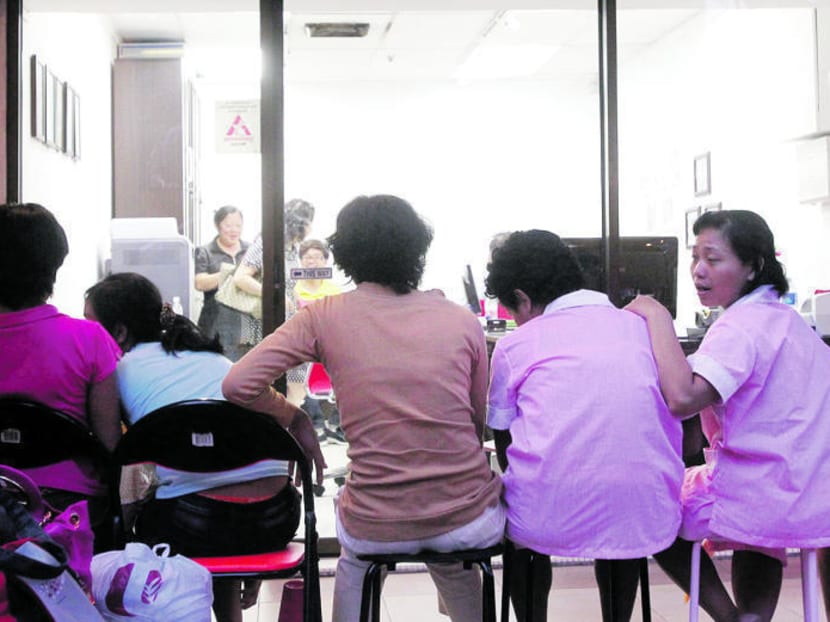NGO disputes report on exploitation of maids, plans to relook survey data
SINGAPORE — A non-governmental organisation (NGO) helping migrant workers has said a study published last month, which found six in 10 foreign domestic helpers here to have been exploited, was published without its consent.
SINGAPORE — A non-governmental organisation (NGO) helping migrant workers has said a study published last month, which found six in 10 foreign domestic helpers here to have been exploited, was published without its consent.
Revealing a rift with the lead researcher of the report, titled Bonded To The System, the Humanitarian Organisation for Migration Economics (HOME) said on Friday (Dec 22) it would re-analyse the data and provide detailed findings in its report, to be presented early next year.
In a statement, HOME said it conceptualised the study in 2014 and engaged Ms Anja Wessels as a volunteer researcher to execute the study on its behalf.
Ms Wessels told TODAY she was transparent in her dealings and findings with the NGO and stands by her findings.
The study covered over 700 Indonesian and Filipino domestic workers and relied on the International Labour Organisation’s (ILO) trafficking indicators to identify migrant domestic workers who were victims of exploitation, forced labour and human trafficking.
However, both sides disagreed on the manner in which some indicators were interpreted. For instance, according to Ms Wessels, a domestic worker who did not have a 24-hour day off or did not have the keys to her employer’s house was classified as someone who was coerced, said HOME.
Ms Wessels also reported Filipinos being more vulnerable than Indonesians. HOME disagreed with the point “as there are many factors apart from nationality that could result in this finding”.
“These concerns were communicated to Ms Wessels as the report was being prepared in its early stages. Due to this disagreement, Ms Wessels left the project in October this year and published the report under Research Across Borders last week without our consent,” said HOME in its statement.
Ms Wessels, who is based in New South Wales in Australia, is director of Research Across Borders, a consultancy.
In response, Ms Wessels – who had volunteered with HOME as a researcher since May 2013 — said the NGO was “aware of the proposed publication date”.
She had conveyed her intent to publish in writing and verbally “on many occasions”, she added.
“It is very important to note that despite HOME’s concerns, after much pre-release due diligence I remain confident in my right to publish,” she said.
Ms Wessels said she welcomes a “professional discourse” with the group on the contentious findings and continues to offer open lines of communication.
The report has adopted the ILO’s framework in measuring the indicators of trafficking of adults for labour exploitation, adapted to the national context, she said.
“In the report, you’ll find a detailed description on how each indicator was assessed via so-called sub-indicators. Additionally, we also added in the appendices all information as to how these initial sub-indicators were derived… I encourage all to read the report and form their own opinions,” said Ms Wessels.
Her study found 60 per cent of survey participants to have taken on hazardous work, clocked excessive hours and slept in a storeroom or at a balcony, among other indicators of labour exploitation. They were surveyed between June and September 2015.
“Excessive working days or hours” was the most prevalent form of exploitation, according to the 152-page study, which also surveyed 80 employers.
Earlier this month, the Ministry of Manpower deemed the study “misleading” and that it adopted an “overly simplistic” interpretation of the ILO’s indicators of labour exploitation. For instance, it defined foreign domestic workers’ working hours without taking into consideration the fact that work and personal time, in the context of domestic work, cannot be easily differentiated.
The ministry also said it was “improper” to interprete isolation and confinement to include situations when a helper needs to seek her employers’ permission to leave the house, is not given her own set of keys or is required to return before midnight on her rest day.










